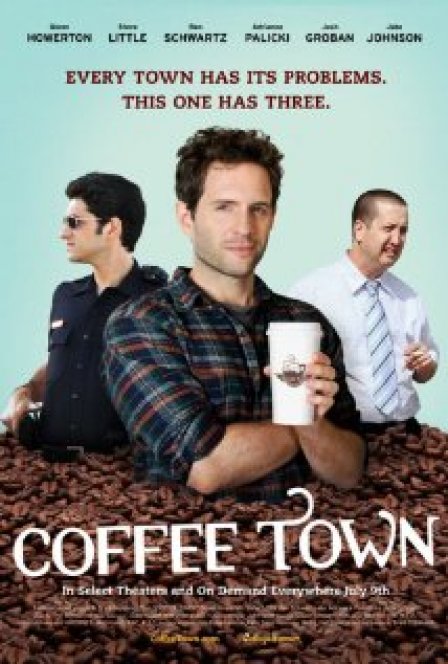As Wi-Fi has exploded across the world — and into millions of cafés — workspaces have changed. Be it for writing, networking, or just goofing around, internet leeches have become a fixture of coffee houses, and a sometimes unwanted one. In that sense, Coffee Town is a perfect first feature for internet comedy hub CollegeHumor. It’s also a surprisingly safe one. Safe in its premise, safe in its characters, and safe right down to its comedy bones.
Will (Glenn Howerton), a web manager, discovers that Coffee Town, his beloved, Wi-Fi-friendly “office”, is being eyed to become a bistro. Adamant that this will ruin the only viable coffee house within walking distance of his apartment, he and his idiot friends resolve to scare away upper management and save Coffee Town as they know it. By robbing it.
Hey, it’s a goofy workplace satire for the modern age; it doesn’t need to be plausible. But it all seems a little too inoffensive to really be satirizing anything. Much of what is potentially offensive seems to exist only to fill an edginess quota, particularly one scene in which Will’s entourage has one of its members fight a man with Down’s syndrome in an empty lot. Moronic salesman Chad (Steve Little) trash talks, irresponsible police officer Gino (Ben Schwartz) antagonizes, and nice-guy everyman Will cringes at the sheer crassness of it all.
Well, okay. It’s hard to get worked up one way or another about empty jokes that just goad a reaction. But Coffee Town stays in its comfort zone, and for all its cutaways and skits, it never really pushes us to feel scared or surprised or nervous. That goes for the characters, too, which is damning for such a talky comedy. Instead of distinctive characters with clear goals and motivations, characters operate as very vague types. The consequence is that there too much mechanical maneuvering towards punchlines. Lines seem contrived to set up punchlines.
The film heavily features narration by Howerton, which reminds us how sweet and loopily cunning he is, but his smarmy self-commentary does little to actually further the comedy, and much to make us dislike Will for being so petty and entitled about the perfect life and workplace he feels he deserves. Little else colors him as a protagonist. He is a sarcastic, fumbling, charming everyman, whose sheer blandness can’t be saved by Howerton’s talents. Chad is bland. Will’s arch-nemesis behind the coffee counter (Josh Groban) is bland. His gorgeous love interest Becca (Adrianne Palicki) is faultless and free of personality.
Only Gino, who sees police work as little but a good tactic to pick up woman and drive recklessly, feels like a proper comedic character with interesting merits and faults: he proffers genuine romantic advice to Will, but is absolutely cavalier with safety. Played with grinning arrogance by Ben Schwarz, Gino doesn’t file reports, doesn’t care about others’ self-esteem, and can’t remember to keep the safety on his gun. The character is subversive and aware of his vices — in short, he feels dangerous, and that’s a quality that’s absolutely essential to a working comedy that is otherwise totally absent from Coffee Town. There are no real repercussions for anyone’s actions. Without repercussions, there are no stakes, no tensed muscles ready to release a belly laugh.
Coffee Town was written and directed by Brad Copeland. As a screenwriter, Copeland has had his big hits (some of Arrested Development’s best episodes) and his misses (Wild Hogs and Yogi Bear), but this is his first outing as a director, and he displays almost zero panache or expressiveness. Camera placement is utilitarian at best, and joke-crushingly awkward at worst. If Copeland is passionate about his material, he never shows it. That lack of passion and risk-taking is what keeps the well-intentioned Coffee Town a decaffeinated bore: Good comedy can be sweet, lowbrow, even dumb. But it’s never safe.

